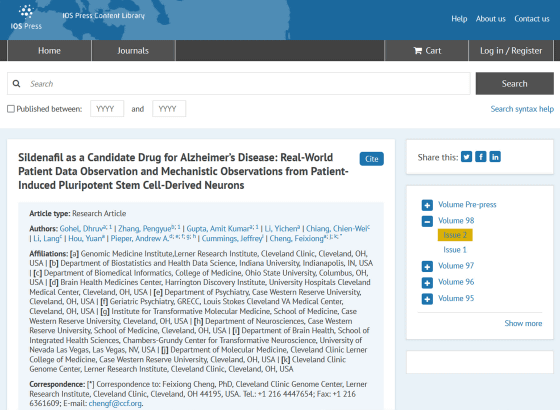Large-scale study confirms Viagra reduces risk of Alzheimer's disease by more than 50%

Sildenafil as a Candidate Drug for Alzheimer's Disease: Real-World Patient Data Observation and Mechanistic Observations from Patient-Induced Pluripotent Stem Cell-Derived Neurons - IOS Press
https://content.iospress.com/articles/journal-of-alzheimers-disease/jad231391

Cleveland Clinic-Led Research Supports Repurposing Sildenafil (Viagra) For Alzheimer's Treatment
https://newsroom.clevelandclinic.org/2024/03/05/cleveland-clinic-led-research-supports-repurposing-sildenafil-viagra-for-alzheimers-treatment/
Huge Study Confirms Viagra Cuts Alzheimer's Risk by Over 50% : ScienceAlert
https://www.sciencealert.com/huge-study-confirms-viagra-cuts-alzheimers-risk-by-over-50
Sildenafil supports erection by inhibiting the activity of the enzyme phosphodiesterase type 5 (PDE-5) and dilating blood vessels around the penis. Furthermore, in recent years, it has been suggested that it reduces excessive phosphorylation of tau protein , which is said to be the cause of Alzheimer's disease, and helps improve cognition and memory.
However, not all studies have confirmed the effectiveness of sildenafil in preventing Alzheimer's disease, and the mechanism behind it is not well understood. Therefore, a research team at the Cleveland Clinic in the United States conducted an analysis using a large-scale patient database and conducted experiments using cultured cells derived from iPS cells of Alzheimer's disease patients.
First, the researchers analyzed millions of anonymized insurance claims data from two independent databases to compare the risk of Alzheimer's disease in patients who took sildenafil and those who did not. After adjusting for factors related to Alzheimer's disease risk, such as gender, age, and disease, researchers found that taking sildenafil reduced the risk of Alzheimer's disease by 30 to 54 percent. A reduction in the risk of Alzheimer's disease was also confirmed in patients treated with sildenafil as a treatment for pulmonary arterial hypertension.

Furthermore, the research team differentiated iPS cells from Alzheimer's disease patients into brain neurons to investigate the effects of sildenafil on nerve cells. It has been confirmed that cultured nerve cells derived from Alzheimer's disease patients accumulate more abnormally phosphorylated tau protein than cultured nerve cells derived from non-Alzheimer's disease patients.
When neurons derived from Alzheimer's disease patients were treated with sildenafil for 5 days, it was found that abnormally phosphorylated tau protein was significantly reduced. It has also been reported that neurons treated with sildenafil showed changes in the expression of hundreds of genes associated with neurodegeneration in Alzheimer's disease, including inflammation and communication between neurons.
Further research is needed to determine exactly how the changes caused by sildenafil affect Alzheimer's disease.
'After computationally integrating this large amount of data, it is rewarding to be able to see the effects of sildenafil in human neurons and the results in real patients,' said co-author Dr.

Related Posts:
in Science, Posted by log1h_ik







